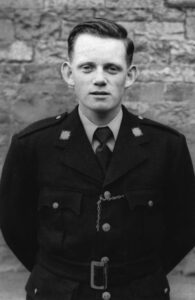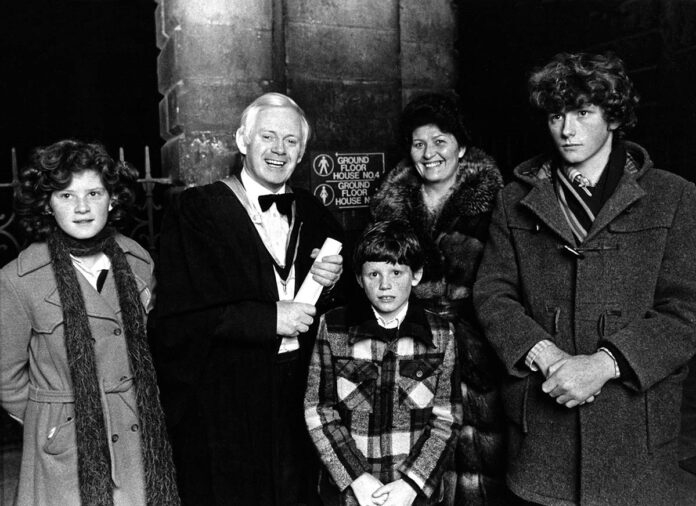Lisdoonvarna native Jack Marrinan’s tireless advocacy improved life for gardai and shaped the modern police force, writes Fiona McGarry
ONE hundred years of An Garda Síochána will be be celebrated this year and among the key figures in the force’s history, a Clare man looms large.
John ‘Jack’ Marrinan was one of a family of nine from Lisdoonvarna and among the second generation of Garda members to take on the role of guarding the peace in the turbulent period through the 1960s and ‘70s.
He travelled to the capital to make his life with the force along with several other Banner men who distinguished themselves in their dedication to duty.
Jack’s biographer, former Garda-turned-author, Tim Doyle, describes the North Clare man as “a hero” and a natural leader who fought consistently for better conditions and pay for rank and file members.

Jack as a garda recruit in 1953.
Instrumental in winning a landmark battle for better working and living conditions for Gardaí, Jack was just 28 when he found himself at the helm of a new representative body for members.
Over the course of the following decades, he became a high profile media performer, a respected negotiator, a representative of rank and file Gardaí and an international expert on policing matters.
His widow Mary told The Champion about her first impressions when she met the young Garda Marrinan who was fresh from the West of Ireland. A Dubliner through and through, Mary said she wasn’t thinking of marriage as the ‘60s dawned.
“Like all the young girls in Dublin at the time, I went to all the dances,” she said. “Jack seemed to be everywhere. It was his name that struck me first. It was very unusual and I’d never heard the name Marrinan before in my life.
“I had not intention of marrying. I was checking out who was available, I suppose. We used to go to The Crystal Ballroom, it was very popular. Jack was already in the representative association when we got married and he was very busy. I didn’t realise at first how busy he really was.”
In the era in which Jack joined the force, Gardaí who were unmarried lived in the station and were on call 24/7. Conditions were basic and leave was limited to a couple of days a month.
That meagre allowance could be cancelled, at a moment’s notice, on the order of superior officers. The management style combined bureaucracy and authoritarian control. The time was ripe for change and Jack Marrinan was the man to lead it.
Frustrated at the refusal of a request for increased pay, several hundred Gardaí attended a meeting at Dublin’s Macushla Ballroom. This was in contravention of the Garda Commissioner’s orders and led to the dismissal of Jack and ten fellow members.
The response from political and religious authorities was unanimous in condemning the actions of the Garda Commissioner, however, and Jack and his colleagues were reinstated ten days later.
“They were very exciting times,” Mary said. “Jack would tell me about some of his aims. There were meetings in the house and Jack would travel to other members’ homes to decide how they were going to proceed.”
After taking charge at the representative association, the Clare man asked economist, and later Taoiseach, Garrett Fitzgerald, to draw up proposals on fair pay and conditions for Gardaí.
This was followed, at the end of the ‘60s, by a formal commission on the subject presided over by Judge Charles Conroy. His report paved the way for enhanced and modernised working conditions that prevail to this day.
In addition to applying his organisational and negotiating skills to the representative group, which later became the Garda Representative Association (GRA), Jack began formal college studies. He studied for his BA and MA at a time when few Gardaí had formal qualifications.
“Jack had to go and get permission from the Bishop to attend Trinity College Dublin (TCD),” Mary recalled.
“He was a Catholic and there was an encyclical letter forbidding Catholics from attending. He went to the Parish Priest in Rathfarnham who asked if he went to Mass. Jack said he did, so the priest told him to register first and then ask permission to go to Trinity.”
Amid the pressure of raising a young family, studying and building up the GRA, Jack did find time to return to Clare. “We brought the kids down to see their grandparents and it was great for Jack to get back to Lisdoonvarna,” Mary said.
The family of two boys and a girl, David, John and Clare, enjoyed their visits west. John recalled the novelty of sampling the world-famous spa waters as a child.
“Dad was a very proud Clare man,” John said. “He was a huge hurling fan and was in his element when Ger Loughnane’s team won the All-Ireland in 1995.”
As Jack’s profile rose, he was a regular contributor to televised debates on matters of policing.
“I remember when our daughter Clare was small,” Mary recounted. “She saw her dad on the television and she started roaring crying and trying to take him out of the back of the TV set.”
On another occasion, John recalled how his father was on business in America, when his children blissfully unaware of the demands on their dad.
“He worked all hours,” John said. “I remember someone phoning the house one day and I asked if Dad was around. Mam told me he was in America. We really didn’t realise how busy he was.”
“He was invited to address different police federations around the world. In fact, he was President of the European Police Federation. He was so busy that I sometimes wondered how he coped. Even now, reading Tim’s book about him [The Changing of the Guard], I wonder how he managed it all. But, he got time to play golf with John and his friends. He did get some time out. Through everything, though, he was proudest of his three children.”
Author Tim Doyle, who met Jack through the GRA, described him as an outstanding leader whose greatest achievement for the force was the work that led to The Conroy Report.
When Jack passed away, in 2015, at the age of 81, national and international tributes were paid to him.
“He was an amazing man who out-talked and out-thought ministers and governments,” Tim said.
“At a time when there was no press office, he effectively was a spokesperson for the force. There’s lots of planning going on now for the centenary and I really believe that Jack Marrinan and the contribution of all of the Gardaí from Clare should be acknowledged. Jack made a huge contribution to policing in this country.”
The Changing of the Guard: Jack Marrinan’s battle to modernise An Garda Síochána is available at Ennis Bookshop and other outlets. It is also available from Currachbooks.com.


